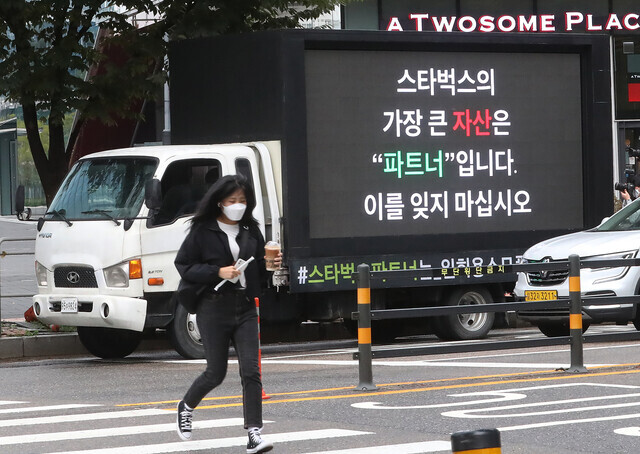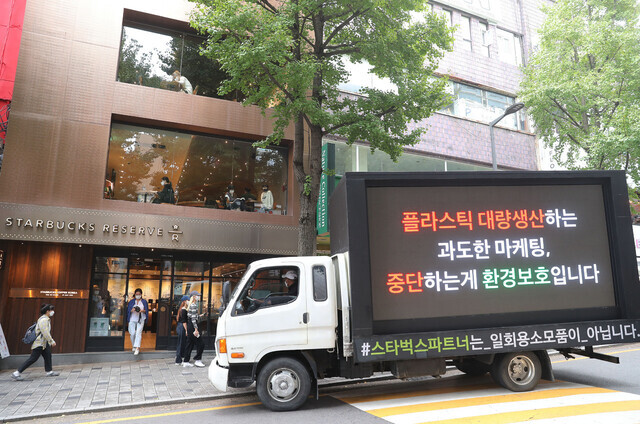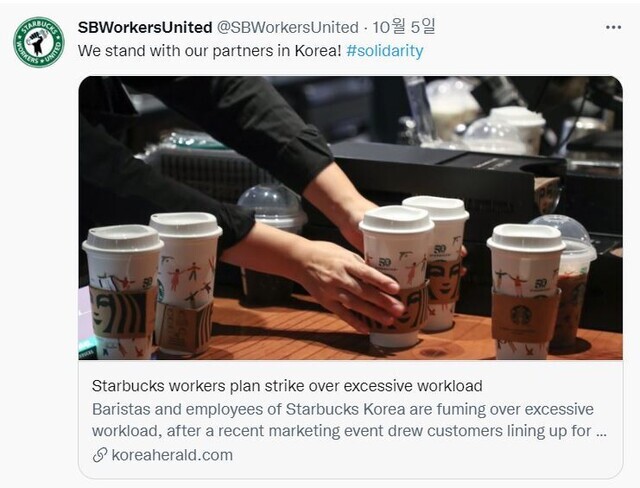hankyoreh
Links to other country sites 다른 나라 사이트 링크
‘We are not disposable': S. Korean Starbucks workers protest for better working conditions

“Partners are Starbucks’ greatest asset. Don’t forget this.”
From 10 am until 6 pm on Thursday, Starbucks employees drove around Seoul in two trucks equipped with electronic signs demanding the hiring of more staff and improved working conditions. Employees had commissioned these trucks to express their frustrations by pooling money through the anonymous community app Blind.
Without a union to represent them, employees of Starbucks Coffee Korea launched the truck protest to voice complaints about the excessive workload imposed due to the company’s frequent marketing campaigns. This collective action by Korean workers comes as US Starbucks employees move to demand better working conditions and form a union.
The event that triggered the truck protest was a promotional giveaway of reusable cups on Sep. 28, which greatly increased employees’ workloads. This led to an explosive reaction over problems that had been simmering under the surface for some time. Staff who had been proud to be employed in full-time positions at the industry’s leading coffee chain came to the consensus that they could no longer stand the excessive workload being imposed on dwindling numbers of employees.
“It was great when I first started,” said S, a Starbucks employee. “To me, Starbucks felt like a place where I could work my entire life, and I was so proud of the job that I told my friends to apply as well. But I wouldn’t recommend it to anyone now.”
Starbucks is alleged to have repeatedly engaged in the practice of deploying employees from nearby stores whenever a new branch opens without replacing the original workers. G, who has worked in a branch for 10 years, told the Hankyoreh, “Even with close to 20 employees it was hard to run the store. We now have less than 15, but the company is pressuring us not to hire any more partners because of ‘excessive labor costs.’ Partners are being treated like expendable parts.”
The number of Starbucks stores grew by 9.2% and 9.8% year-on-year in 2019 and 2020, while the number of employees (based on a notice issued in March by the Ministry of Employment and Labor) only rose by 8.4% and 6.9%, respectively.

While staff numbers remain stagnant, the number of marketing events has skyrocketed in recent times.
“Over the last few years, the number of events has really shot up, with daily notices on changes ahead of the event and even on the day itself, a never-ending stream of marketing events, and even events within other events,” said N, who has worked in a branch located in the capital area for six years. “There are times when we have to read more than two or three event manuals in a day. It feels as if they have no idea what’s happening in stores, and just keep issuing a steady stream of work that is more than we can handle.”
Staff are concerned that the status quo is detrimental to customer service.
“Starbucks places great emphasis on customer interaction, and each store receives a score as part of monthly assessments,” G said. “But these days it’s hard enough just to sell drinks, let alone pay much attention to customers or care about in-store hygiene.”
Upon receiving notice of the truck protest, Starbucks Coffee Korea CEO Song Ho-seop sent a company-wide email in which he promised improvements. However, employees did not seem impressed. G told us, “It didn’t seem like an apology at all,” and N said, “I didn’t see him say sorry.”
Around 80 employees from three Starbucks stores in Buffalo, New York, have been trying to form a union since late August, and it remains to be seen whether Korea will follow suit. Starbucks headquarters is not in favor of the union and stated that all 20 Buffalo stores will have to vote on the matter.

Calling themselves “Starbucks Workers United,” employees from Buffalo shared a link to an article about South Korean workers’ truck protest on their Twitter (@SBWorkersUnited) along with the message “We support our Korean partners #solidarity” on Oct. 5.
Those who took part in the truck protest have stressed on multiple occasions that outside forces such as the Korean Confederation of Trade Unions were not involved. Most are young employees who tend to take a dim view of labor unions, so there are conflicting views on founding a union.
“We need something like a labor union for [headquarters] to take in-store workers seriously,” said G. “But I don’t think [forming a union] will be easy.”
By Park Su-ji and Lee Woo-yun, staff reporters
Please direct questions or comments to [english@hani.co.kr]

Editorial・opinion
![[Column] Season 2 of special prosecutor probe may be coming to Korea soon [Column] Season 2 of special prosecutor probe may be coming to Korea soon](https://flexible.img.hani.co.kr/flexible/normal/500/300/imgdb/original/2024/0426/3317141030699447.jpg) [Column] Season 2 of special prosecutor probe may be coming to Korea soon
[Column] Season 2 of special prosecutor probe may be coming to Korea soon![[Column] Park Geun-hye déjà vu in Yoon Suk-yeol [Column] Park Geun-hye déjà vu in Yoon Suk-yeol](https://flexible.img.hani.co.kr/flexible/normal/500/300/imgdb/original/2024/0424/651713945113788.jpg) [Column] Park Geun-hye déjà vu in Yoon Suk-yeol
[Column] Park Geun-hye déjà vu in Yoon Suk-yeol- [Editorial] New weight of N. Korea’s nuclear threats makes dialogue all the more urgent
- [Guest essay] The real reason Korea’s new right wants to dub Rhee a founding father
- [Column] ‘Choson’: Is it time we start referring to N. Korea in its own terms?
- [Editorial] Japan’s rewriting of history with Korea has gone too far
- [Column] The president’s questionable capacity for dialogue
- [Column] Are chaebol firms just pizza pies for families to divvy up as they please?
- [Column] Has Korea, too, crossed the Rubicon on China?
- [Correspondent’s column] In Japan’s alliance with US, echoes of its past alliances with UK
Most viewed articles
- 1AI is catching up with humans at a ‘shocking’ rate
- 21 in 5 unwed Korean women want child-free life, study shows
- 3Korea’s 1.3% growth in Q1 signals ‘textbook’ return to growth, says government
- 4Division commander ordered troops to enter raging flood waters before Marine died, survivor says
- 5[Column] Park Geun-hye déjà vu in Yoon Suk-yeol
- 6[Column] Season 2 of special prosecutor probe may be coming to Korea soon
- 7Marriages nosedived 40% over last 10 years in Korea, a factor in low birth rate
- 8[Column] Has Korea, too, crossed the Rubicon on China?
- 9‘Weddingflation’ breaks the bank for Korean couples-to-be
- 10Is Japan about to snatch control of Line messenger from Korea’s Naver?